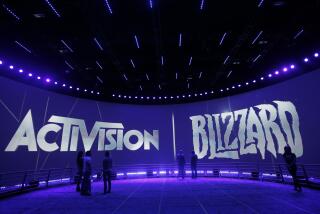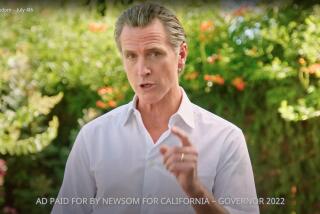Microsoft Ad Aims to Boost Image
- Share via
SEATTLE — Microsoft plans to debut a new television ad Sunday featuring Chief Executive Steve Ballmer, underscoring the software giant’s efforts to counter the flogging its image has taken during the long-running antitrust trial.
Meanwhile, the company has also sharply ramped up its funding of political parties and candidates, part of a broad but belated effort to raise its profile in Washington.
Microsoft’s intensified lobbying and advertising efforts have met with mixed results. Public opinion polls indicate that a majority of Americans oppose a Microsoft breakup. And in some cases, its money has won new political converts, even influential ones. Senate Majority Leader Trent Lott (R-Miss.) and Rep. J.C. Watts Jr. (R-Okla.), among other lawmakers, have accused the antitrust division of wrongly trying to bring down Microsoft.
In the 30-second advertisement titled “Technology and the Economy,” Ballmer will emphasize that Microsoft is “still focused on innovating, delivering value and listening to customers.”
Wearing a casual button-down shirt, Ballmer addresses the camera directly, in a style similar to an advertisement two weeks ago that featured co-founder and Chairman Bill Gates. Ballmer also uses the same ending as Gates: “The best is yet to come.”
The Ballmer TV spot is the latest effort by Microsoft to boost its image before the American public and the politicians in Washington, D.C.
Microsoft already has doubled its so-called soft-money contributions to both parties from the last election cycle two years ago. The company has donated $863,400 to the Republican and Democratic national committees, but the donations account for only one year of the 1999-2000 election cycle, according to the Center for Responsive Politics.
That’s compared with $774,816 in soft money that Microsoft gave both parties for the entire 1997-1998 election cycle.
With $18 billion in cash reserves, the company has plenty of muscle to flex in political circles. Microsoft gave $1.7 million to politicians and parties in 1999, dwarfing the political giving of other high-technology companies.
The combination of political action committee donations, soft-money contributions and individual giving is more than twice as much as the tech sector’s next-largest donor, rival America Online, which so far has given $657,150 to political organizations, according to the Center for Responsive Politics.
Microsoft also is trying to drum up grass-roots support through its Freedom to Innovate Network, a Web site that can be accessed at Microsoft’s home page. The site provides the latest trial news, along with information on how to contact members of Congress.
The Web site strongly urges citizens, partners and customers to write letters to their congressional representatives opposing the government’s proposal to break the company into two pieces.
“We did that in response to thousands of inquiries from people all over the country who had concerns about the lawsuit and wanted their voices to be heard,” said Rick Miller, a Microsoft spokesman for government affairs.
The Ballmer advertisement is the latest installment of a new corporate image campaign since the antitrust trial reentered the national spotlight last month.
At the same time, Gates and Ballmer are taking much tougher public stances, saying that the company has done nothing wrong and will win on appeal. They also have visited Washington, D.C., since U.S. District Court Judge Thomas Penfield Jackson ruled April 3 that Microsoft violated antitrust laws.
Still smarting from the court ruling, Gates flew immediately to the nation’s capital to participate in a technology summit set up by President Bill Clinton. Gates later visited congressional leaders in four meetings on Capitol Hill.
Microsoft’s critics say the software giant’s presence in the capital is enormous but that the company is often clumsy and arrogant in how it treats people.
“They are trying to intimidate the process with political pressure,” said Ed Black, president of the Computer Communication Industry Assn., a Washington, D.C., trade group and a Microsoft foe. “It is an outrageously blatant attempt to try to nullify a judicial and law enforcement proceeding by leveraging their political muscle and money.”
But Microsoft officials, who note that five years ago the company had just one full-time staff person in Washington, D.C., compared with 14 today, said they are trying to counter their competitors who are very active in lobbying Congress.
“We will absolutely not let our competitors try to characterize us,” Miller said. “We will stand up and talk about the values important to this company.”






